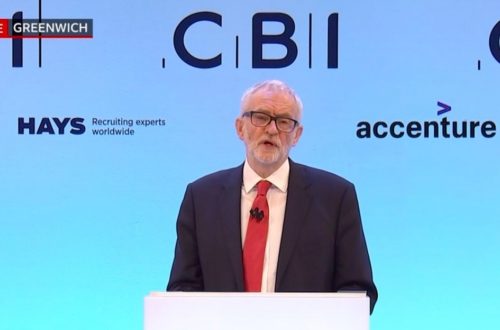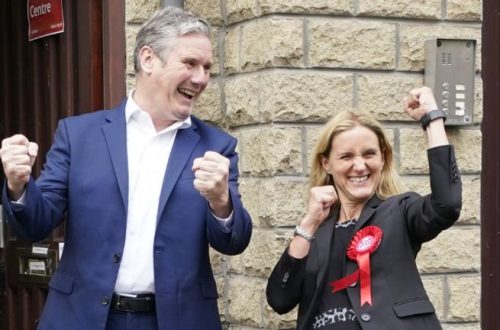This is a guest post by Amjad Khan
One of the negative outcomes of the post 7/7 debate on Islamist inspired extremism and terrorism is the fact that some journalists believe that just because someone is a Muslim he/she will inevitably be an expert on Islamist extremism. At first we were subjected to former corner shop owner turned Labour peer, Lord Nazir Ahmed, making bizarre and incomprehensible statements. Then we had to endure the buffoonery of Shahid Malik and Khalid Mehmood, both complete and utter imbeciles who only got elected due to the clan/tribal politics within the Pakistani communities in which they stood. And recently, we have been treated to more stupidity from another clueless and unelected Peer, Sayeedi Warsi.
All of the above mentioned individuals are more reminiscent of characters from ‘Carry On up the Khyber’ rather than serious commenter’s on socio-political issues. Whilst their comments should be viewed as entertainment rather than political analysis, the silliness doesn’t stop there. We now have spokespersons from the Ramadhan Foundation making complete fools of themselves.
The left-leaning Israeli paper Haaretz, recently carried an interview with Muhammad Shafiq, who is the CEO of the Ramadhan Foundation. The interview focused on David Cameron’s recent Munich speech about Islamist extremism. Shafiq’s opening gambit was:
“I was deeply disappointed in the prime minister, who made allegations that tar a whole community. Who is he talking about? Muslims in Britain by and large are integrated and oppose terrorism in the U.K. and anywhere else in the world just like any other Brits. Terror is an evil and the killing of innocent people is forbidden in Islam.”
This is absolute nonsense. Cameron’s speech was an indictment of failed government policies not an attack on all Muslims. He went to great lengths to differentiate Islam the faith and ordinary Muslims from Islamist extremism, just as every politician before him has done so. He continues:
“Those people engaged in terrorism do not represent our community, and the prime minister is deeply irresponsible to try and link extremism, terrorism and our successful multiculturalist society.”
Shafiq must be one of the few people who thinks we live in a ‘successful multiculturalist society’, again I suspect he doesn’t understand the term. He assumes, like the Guardian crowd does, that Multiculturalism merely means the co-existence of different people. No wonder he thinks it should be de-linked from terrorism. There’s more:
“But political extremism is already shunned within our community! Those who advocate violence are stopped from being in the community. We do that already, so his argument does not make sense. I am truly baffled as to why he is saying these things.”
I think I’m truly baffled too. Of course, most Muslims oppose terrorism, but extremism is not just about opposing terrorism. It is about actively rejecting ideas that lead to intolerance, bigotry and tensions in communities. I don’t think Shafiq understands this quite obvious point. He deliberately uses extremism and terrorism interchangeably as though they are exactly the same thing. This only highlights the fact that he doesn’t really want to acknowledge or deal with non-violent extremism. I wonder why? Maybe this part of his interview has the answer:
“If the prime minister is trying to say that we give up our culture and the particular way in which we do things, we are not signing up for that – that is an objectionable request. But if he wants to ask us about rule of law and democracy and the like, we already hold those values dear without anyone needing to tell us to do so.”
This is truly a bizarre statement. What does he mean by ‘the particular way we do things’? Is he referring to hosting hate preachers like Zakir Naik, which his supposedly peace loving organisation has done in the past. Or maybe holding ‘Muslim Unity’ events that showcase extremists of all stripes including Yvonne Ridley (Press TV host and supporter of AQ in Iraq), Muhammad Ali Harrith (co-founder of terrorist group Tunisian Islamic Front), Imran Waheed (Spokesperson from Hizb ut Tahrir). I now understand why he attempts only to tackle terrorism whilst ignoring non-violent extremism.
“No, there was no mention of any other group in the speech. It was all about Muslims and terrorism.”
Actually there was no mention of any groups at all, but Cameron did mention the far-right. Maybe Shafiq didn’t hear the speech at all and instead relied on media sound bites.
“When I was younger I went to an English school, and I had many non-Muslim white friends. To suggest that the Muslims don’t want to integrate is absurd. I was born in this country and have lived here my whole life. I feel British and I am British.”
Cameron did not say that Muslims don’t want to integrate, nor did he say that Muslims aren’t British. But I think we have heard enough of Shafiq’s musings on an issue he clearly has zero knowledge about.
There are two further things that are worrying about this. Firstly, the fact that so many Muslim activist types are keen to deflect criticism of any kind that they, in turn, direct all attention towards the far-right. This happens in spite of the fact that they are completely oblivious to their own passive tolerance of extremists within Muslim circles, in the case of the Ramadhan Foundation hosting Hizb ut Tahrir. Secondly, many Muslims are so fearful of the media spotlight that any type of discussion which isn’t uncritically praising Muslims and Islam is interpreted as an attack. This is usually followed by all the usual stock responses being wheeled out, i.e. most Muslims abhor terrorism, we are so well integrated already, what about the far-right etc.
The result of this dishonest and inaccurate rhetoric is that now we live in a society where mature debate about real issues is hampered at every turn. With liberals shouting ‘racist’ and Muslim activists shouting ‘don’t talk about us’ it is very difficult to make any progress. This in turn only aggravates existing tensions and allows problems to fester.
As a Muslim who acknowledges the many serious issues that affect Muslim communities in the UK, I would much prefer sensible and responsible voices being sought out by journalists. I would also like to see the far-right being deprived of fodder. But I may be waiting a while yet.


